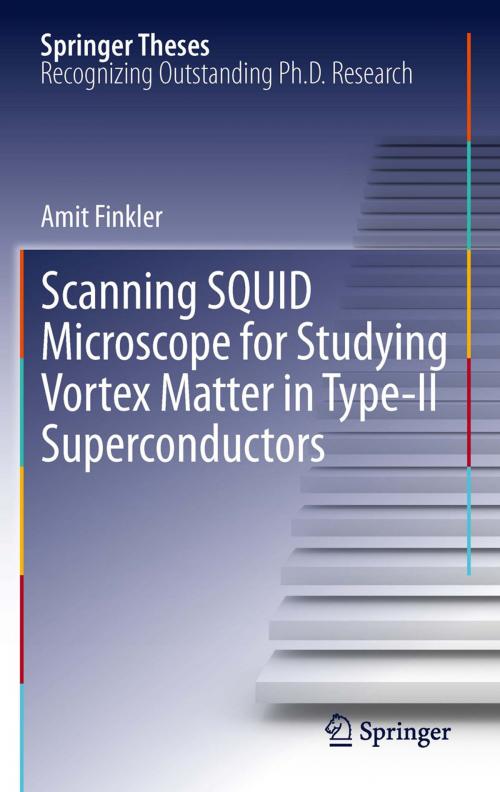Scanning SQUID Microscope for Studying Vortex Matter in Type-II Superconductors
Nonfiction, Science & Nature, Science, Physics, Spectrum Analysis, Magnetism| Author: | Amit Finkler | ISBN: | 9783642293931 |
| Publisher: | Springer Berlin Heidelberg | Publication: | May 17, 2012 |
| Imprint: | Springer | Language: | English |
| Author: | Amit Finkler |
| ISBN: | 9783642293931 |
| Publisher: | Springer Berlin Heidelberg |
| Publication: | May 17, 2012 |
| Imprint: | Springer |
| Language: | English |
Common methods of local magnetic imaging display either a high spatial resolution and relatively poor field sensitivity (MFM, Lorentz microscopy), or a relatively high field sensitivity but limited spatial resolution (scanning SQUID microscopy). Since the magnetic field of a nanoparticle or nanostructure decays rapidly with distance from the structure, the achievable spatial resolution is ultimately limited by the probe-sample separation. This thesis presents a novel method for fabricating the smallest superconducting quantum interference device (SQUID) that resides on the apex of a very sharp tip. The nanoSQUID-on-tip displays a characteristic size down to 100 nm and a field sensitivity of 10^-3 Gauss/Hz^(1/2). A scanning SQUID microsope was constructed by gluing the nanoSQUID-on-tip to a quartz tuning-fork. This enabled the nanoSQUID to be scanned within nanometers of the sample surface, providing simultaneous images of sample topography and the magnetic field distribution. This microscope represents a significant improvement over the existing scanning SQUID techniques and is expected to be able to image the spin of a single electron.
Common methods of local magnetic imaging display either a high spatial resolution and relatively poor field sensitivity (MFM, Lorentz microscopy), or a relatively high field sensitivity but limited spatial resolution (scanning SQUID microscopy). Since the magnetic field of a nanoparticle or nanostructure decays rapidly with distance from the structure, the achievable spatial resolution is ultimately limited by the probe-sample separation. This thesis presents a novel method for fabricating the smallest superconducting quantum interference device (SQUID) that resides on the apex of a very sharp tip. The nanoSQUID-on-tip displays a characteristic size down to 100 nm and a field sensitivity of 10^-3 Gauss/Hz^(1/2). A scanning SQUID microsope was constructed by gluing the nanoSQUID-on-tip to a quartz tuning-fork. This enabled the nanoSQUID to be scanned within nanometers of the sample surface, providing simultaneous images of sample topography and the magnetic field distribution. This microscope represents a significant improvement over the existing scanning SQUID techniques and is expected to be able to image the spin of a single electron.















